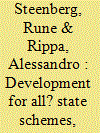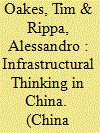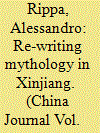| Srl | Item |
| 1 |
ID:
164691


|
|
|
|
|
| Summary/Abstract |
The past decade of development schemes has been experienced very differently by various groups within the city of Kashgar in the Xinjiang Uyghur Autonomous Region of China. The recent exacerbation of social inequalities, stratification, and tensions in Kashgar is a structural consequence of two phases of government policies: an accelerated formalization of the economy and remodelling of the city-scape as part of modernistic development implemented before 2014, followed by a phase of strong securitization. Based on long-term ethnographic fieldwork between 2009 and 2017, this paper analyzes the situation, reactions, and strategies of different groups of Uyghur residents of Kashgar to cope with the changing socio-economic and political environment.
|
|
|
|
|
|
|
|
|
|
|
|
|
|
|
|
| 2 |
ID:
192619


|
|
|
|
|
| Summary/Abstract |
Despite China's leading role in the construction of infrastructure over the past decades, the most influential paradigms for the study of infrastructure in the social sciences originate from research conducted elsewhere. This introduction to the special section “Chinese Infrastructure: Techno-politics, Materialities, Legacies” seeks to address this apparent gap, and contributes to building an innovative research agenda for an infrastructural approach in the China studies field. To do so, it pushes forward an understanding of infrastructure as both an empirically rich material object of research and an analytical strategy for framing research questions. We draw from two strands of inquiry: recent efforts to rethink the materiality of infrastructures not as an inert or stable basis upon which more dynamic social processes emerge, but rather as unstable assemblages of human and non-human agencies; and scholarship that explores the often hidden (techno-)political dimensions of infrastructures, through which certain intended and unintended outcomes emerge less from the realms of policy and implementation and more from the material dispositions and effects of infrastructural formations. These strands of inquiry are brought together as part of our effort to recognize that the infrastructural basis of China's approach to development and statecraft deserves a more concerted theorizing of infrastructure than we have seen thus far.
|
|
|
|
|
|
|
|
|
|
|
|
|
|
|
|
| 3 |
ID:
130435


|
|
|
|
|
| Publication |
2014.
|
| Summary/Abstract |
The Chinese Communist Party has often used history as a tool to serve its political purposes. This article analyzes the ways in which mythological accounts have been manipulated in order to strengthen Beijing's control over the restive northwestern province of Xinjiang. Relying on an analysis of various materials (including museum exhibitions, textbooks and travel guides), I explore how the figures of the Queen Mother of the West and King Mu of the Zhou have been used to assert that Xinjiang has been an inalienable part of China since prehistoric times. The materials analyzed treat mythological texts as valid sources of geographical and historical data, whereas Western scholars largely agree that these cannot provide any reliable information of this kind. In accordance with the tradition of early commentators, I define this approach as euhemeristic, in that it treats mythological accounts as a reflection of historical events.
|
|
|
|
|
|
|
|
|
|
|
|
|
|
|
|